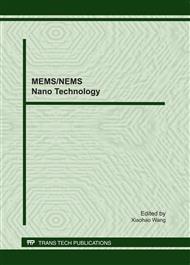p.750
p.755
p.760
p.765
p.770
p.775
p.779
p.784
p.789
The Study of Humidity Effect on Self-Heated Surface Micromachined Polysilicon Resistor
Abstract:
Polysilicon is a very attractive material in microelectronics for thermal sensors. In this paper, the effect of humidity on thermal resistance of surface micromachined polysilicon is invested. It is found that the thermal conductivity variation of air due to humidity changes the suspended polysilicon resistor evidently. This property could be used as the working principle of relative humidity sensor.
Info:
Periodical:
Pages:
775-778
DOI:
Citation:
Online since:
June 2011
Authors:
Keywords:
Price:
Сopyright:
© 2011 Trans Tech Publications Ltd. All Rights Reserved
Share:
Citation:


